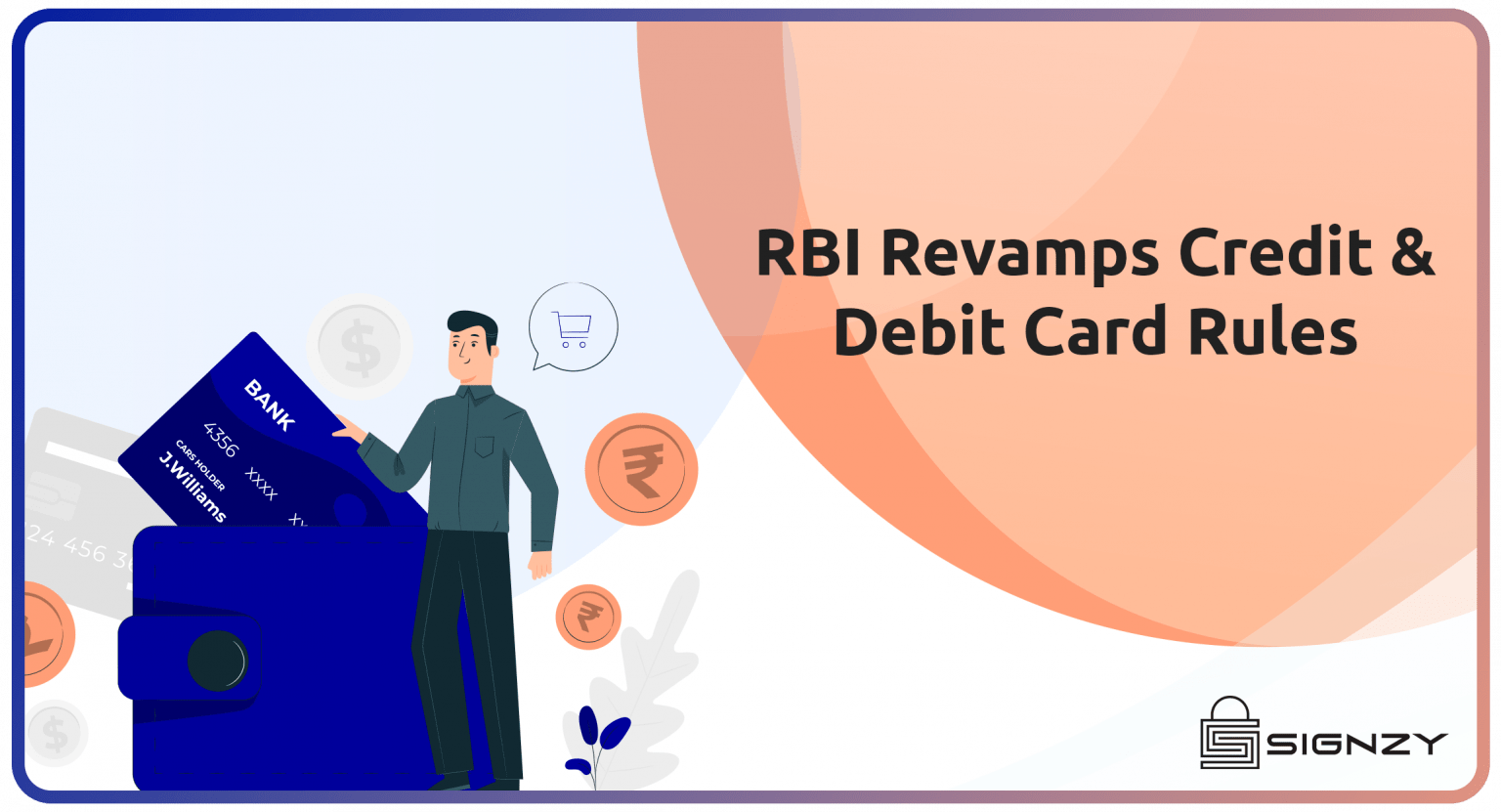Know Everything About The RBI’s New Rules Revamp For Credit And Debit Cards
With over 5,90,000 ATM transactions and close to 211 million POS(point-of-sale) credit card transactions, December 2021 was an intriguing month for the financial industry. These numbers keep on increasing, and the government is taking measures to ensure that card issuers do right by the customers.
The Reserve Bank of India(RBI) provided new rules for the Issue of credit and debit cards and apt directions to issuing agencies. The new rules will be implemented from July 1, 2022.
These directions encompass the conduct regulations relating to credit, debit, and co-branded cards and their payments. They apply to every bank in India.
The official RBI website prescribes the new rules as master directions. These are meant to provide just treatment for debit and credit services customers. The RBI website also hints at further reforms in the coming months.
General guidelines for card issuance
- If a card is blocked at the customer’s request, a replacement card can only be issued with the customer’s explicit consent. Further, the card issuer must obtain the explicit consent of the cardholder before the renewal of an existing card.
- The T&C for issuing and usage of a card will be mentioned in simple language with clarity. This will preferably be in Hindi, English, and regional languages.
- If any convenience fee is charged on specific transactions, it shall be transparently indicated to the cardholder before the transaction.
- The terms shall specify the time for a reversal of failed transactions and the compensation payable for failure to meet the specified timeline.
- The card issuer may alter terms, but they must provide a 30 days notice of the change to the cardholder to enable the customer to withdraw if they choose.
Guidelines for debit cards
- Debit cards shall only be issued to savings bank or current accounts customers.
- Banks will not force a customer to avail of a debit card facility and shall not link issuance of a card to opt for any additional facility from the bank.
Guidelines for credit cards
- Unsolicited upgrading or the Issue of unsolicited cards is strictly prohibited. Suppose an unsolicited card is issued, or an existing card is upgraded and activated without the customer’s explicit consent (a bill is generated). In that case, the card-issuer shall reverse charges and pay the penalty amounting twice the value of reversed charges.
- The card-issuer is wholly held responsible if there is a misuse of such unsolicited cards (before reaching those whose names it was issued).
- Consent must be explicit for the Issue of cards- i.e., written consent is required before a credit card issuance. If written permission is difficult to obtain, digital means can be used but must be communicated to the RBI.
- Card issuers and third-party agents have been told not to resort to intimidation or harassment during the recovery of dues.
Guidelines for loss of cards
- Card-issuer will block a lost card immediately after being informed.
- Card issuers shall provide detailed information on reporting loss, theft, or unauthorized use of a card or even the PIN. This must include channels such as a dedicated number for SMS, a dedicated helpline, a dedicated e-mail-id, a visible hyperlink on the website, internet banking and mobile app, etc.
- Card issuers shall immediately send a confirmation after blocking the card.
Grievances and Complaints
- Card issuers shall implement mechanisms and provide publicity. They should mention the name, email-id, contact number, and the designated officer’s postal address on the account statements and credit card bills.
- The designated officer ensures that the grievances of cardholders are redressed promptly without delay.
- Card issuers must ensure call center staff is trained to manage and escalate complaints. There should be an effective system of acknowledging customers’ complaints about apt follow-ups, including complaint numbers, even if complaints are received over the phone.
- Card issuers will be liable to compensate the complainant for loss of time, expenses, financial loss, and the harassment suffered for the mistakes of the card issuer if they did not redress the grievance in time. If a complainant receives no satisfactory response from the card issuer within a span of one month from the date of the lodged complaint, they can approach the RBI to redress grievances.
Confidential customer information
- Card issuers will not reveal information regarding the customers without obtaining their consent. They must tell customers the purpose of the information and the organizations they will share the information with.
- Information sought from customers cannot violate law provisions relating to maintaining secrecy in transactions. The card issuers will be responsible for the accuracy or otherwise of the data provided.
Conclusion
This master direction for credit and debit cards is an excellent effort from the government’s side to provide customer convenience and ensure just treatment. This will boost credit and debit card usage in the coming years. Notwithstanding this, it is a burden on many financial institutions. The entire onboarding structure will need scrutiny and revamp. They require reliable, safe, and user-friendly fintech services. With a no-code AI-driven platform and multiple customizable API resources, Signzy can undoubtedly provide you with the solutions you seek.
About Signzy
Signzy is a market-leading platform that is redefining the speed, accuracy, and experience of how financial institutions are onboarding customers and businesses – using the digital medium. The company’s award-winning no-code GO platform delivers seamless, end-to-end, and multi-channel onboarding journeys while offering totally customizable workflows. It gives these players access to an aggregated marketplace of 240+ bespoke APIs that can be easily added to any workflow with simple widgets.
Signzy is enabling ten million+ end customer and business onboarding every month at a success rate of 99% while reducing the speed to market from 6 months to 3-4 weeks. It works with over 240+ FIs globally, including the 4 largest banks in India, a Top 3 acquiring Bank in the US, and has a robust global partnership with Mastercard and Microsoft. The company’s product team is based out of Bengaluru, and it has a strong presence in Mumbai, New York, and Dubai.
Visit www.signzy.com for more information about us.
You can reach out to our team at reachout@signzy.com
Written By:

Signzy
Written by an insightful Signzian intent on learning and sharing knowledge.



